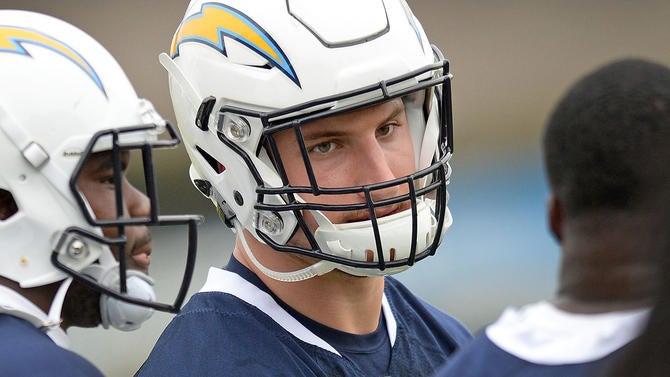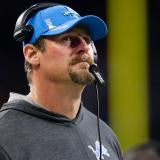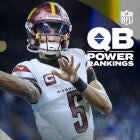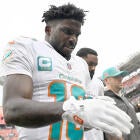The Chargers and Joey Bosa are engaged in the longest contract dispute for an incoming NFL player since a rookie wage scale was implemented in 2011. The third-overall pick has missed 18 days of training camp so far.
There are very few negotiable items with rookie contracts anymore because of the collective bargained wage scale. Each pick has a salary floor and ceiling based on draft position. All contracts are four years in length, except teams have an option for a fifth year with first-round picks. This streamlining of negotiations has significantly quickened the pace of signings overall.
The Chargers and Bosa aren't disagreeing about money. His fully guaranteed four-year contract should be worth $25,873,662, which includes a $17,017,212 signing bonus. The dispute is largely over two things: whether the deal should contain offsets, and the payment schedule of his signing bonus.
What are offsets and why do they matter?
An offset clause allows a team to reduce the guaranteed money owed to a player when he is released by the amount of his new deal with another team. The player receives his salary from the team that released him in addition to the full salary from his new contract with another club when there isn't an offset (also known as "double dipping").
For example, if Bosa is released in 2019 when his salary is almost $4 million and he signed a new deal with the Green Bay Packers for that season for $2 million, the Chargers would be able to recoup the $2 million from the Packers to help cover their guarantee instead of Bosa making $6 million collectively from both teams. Practically speaking, the offset issue will only come into play in the latter years of rookie deals if the player is a disappointment.
Large signing bonuses in NFL contracts are typically paid in installments rather than the player receiving the entire amount upon execution of the agreement. This practice has been a way of life in the NFL for quite some time. When Peyton Manning signed a seven-year deal with the Colts back in 2004 that made him the NFL's highest-paid player, $18.5 million of the $34.5 million wasn't paid until a year later.
Signing bonuses for top draft picks are usually paid in two-to-four installments. Payment of the entire signing bonus before the end of a player's rookie season can depend on whether his contract contains offsets. A team generally receives a more favorable signing bonus payment schedule with a significant amount deferred until early in the next calendar year when there aren't any offsets. This type of deferment also occurs sometimes in contracts with offsets.
Agents have essentially lost the battle on offsets. Teams with early first-round picks in 2013 were insistent that contracts contain offsets after largely conceding the issue the previous year. As a compromise, most teams structure deals containing minimum base salaries in the final three years with the remainder of a player's salary in annual rosters bonuses that become fully guaranteed on the third or fifth day of training camp. Every team, with the exception of the Jaguars and Rams, now require offsets with salary guarantees for draft picks.
Bosa's camp is willing to accept a contract without offsets where a portion of the signing bonus is deferred to 2017 or a deal with offsets but the entire signing bonus is paid in 2016. The Chargers want a contract which has offsets and signing bonus deferred to 2017. The two sides reportedly have been an impasse since late July where the Chargers still haven't responded to Bosa's latest offer.

Here's a look at why each side is right and the expected outcome of the dispute.
Why Bosa is right
- Third-pick conventions: The last two third-overall picks, Blake Bortles in 2014 and Dante Fowler, Jr. in 2015, received deals from the Jaguars without offsets. Before that, Dion Jordan signed a deal containing offsets. His signing bonus was paid in four installments. The final payment was at the end of November 2013.
- Historical treatment of top-five picks: After getting acclimated to the new rookie compensation system for a year, 18 of 24 top-five picks since 2012 either have no offsets or an offset without signing bonus deferred into following calendar year. The six with both offsets and a deferred portion of the signing bonus include Carson Wentz, who reportedly voluntarily deferred the last $1 million of his signing bonus until January 2017 for tax purposes.
- Philip Rivers: The Chargers paid $17 million of Rivers' $22.5 million signing from his 2015 contract extension before the end of the season. This amount is almost the same as Bosa's entire signing bonus. The Chargers paid Rivers $32 million in 2015 because his base salary was $15 million. Bosa's combined signing bonus and base salary if paid in 2016 would be approximately $17.45 million, which is less than 55 percent of what Rivers received from the Chargers in 2015.
Why San Diego is right
- Team policy on offsets: All San Diego contracts with guarantees contain offsets. It is unrealistic for Bosa to expect a new precedent to be set for him when players making more money, including Rivers, have offsets.
- Team history with signing bonuses: All San Diego deals with large signing bonuses have some portion payable on March 15 of the next calendar year. Although the signing bonuses were considerably smaller for 2014 and 2015 first-round picks, Jason Verrett and Melvin Gordon, because they were taken 25th and 15th overall respectively, approximately two-thirds was received within 10 days of signing with the remainder payable the following March.
- Historical treatment of the No. 1 pick: The top pick should receive a more favorable deal in all aspects by virtue of going first. Prior to the Rams taking Jared Goff No. 1 this year, three consecutive first picks signed deals with both offsets and signing bonus deferred into the following year. Approximately $4.5 million of 2013 first-overall pick Eric Fisher's signing bonus with the Chiefs wasn't payable until February 2014. The Texans deferred a little more than $3.625 million in signing bonus with 2014 first-overall pick Jadeveon Clowney. It was received the next February. 2015 top pick Jameis Winston had $6 million of his signing bonus deferred until the end of this past March by the Buccaneers.
Prediction
Standard negotiation protocol dictates that the Chargers give Bosa's camp some sort of response even if it's just reiterating comfort in their position. San Diego expecting Bosa's camp to counter their own offer would be unusual and unreasonable.
Both sides seem penny wise and pound foolish since the dispute is partially about what happens if Bosa is a big failure, which is absurd to many. It isn't a good look publicly for a team wanting a new stadium after a lousy season to be playing hardball with such a high pick. The missed time is delaying Bosa's development and ability to make a big contribution immediately.
It's hard to imagine this dispute continuing into the regular season out of principle. Bosa is fighting an uphill battle, because a majority of teams attempt to preserve contractual precedents at almost all costs. The concern is making a concession to one player will open the floodgates for other players to expect similar treatment in the future. In actuality, teams should be able to make distinctions based on each player's particular circumstances without jeopardizing the integrity of a policy.
There are numerous ways the Chargers could justify accommodating Bosa on the signing bonus payment schedule. Because of this power of precedent, it wouldn't be a surprise if Bosa conceded both issues at some point during the preseason since he really doesn't have leverage even though his position is defensible. The training camp roster bonuses would be a necessity with a Bosa concession.
The Chargers should be willing to give Bosa one of their most favorable signing bonus payment schedules in a contract containing offsets. He could receive the same $8.5 million Rivers got within 10 days of signing. An additional $4.25 million could be payable in equal installments over the regular season. Rivers had $8.5 million in this manner. The remaining $4,267,212 of Bosa's signing bonus would be received next March 15. This would make approximately 75 percent of Bosa's signing bonus payable in 2016, which is comparable to Rivers' percentage.
![[object Object] Logo](https://sportshub.cbsistatic.com/i/2020/04/22/e9ceb731-8b3f-4c60-98fe-090ab66a2997/screen-shot-2020-04-22-at-11-04-56-am.png)

















